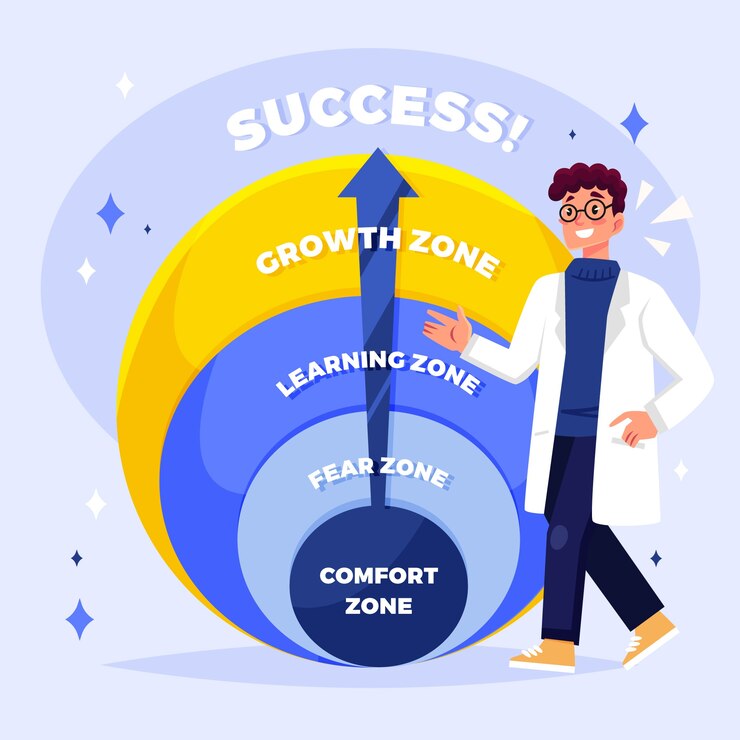The Power of Emotional Intelligence: Unlocking Success in Life and Relationships
Introduction
Imagine you’re in a high-pressure meeting where tensions are running high. People are visibly frustrated, and the atmosphere is thick with emotion. One person, however, remains calm and composed, skilfully navigating the room’s mood and eventually steering the conversation towards a constructive resolution. Later, you find out that this individual is not just a “people person” but someone who excels in Emotional Intelligence.
Or picture a couple who have been together for many years. They’ve had their fair share of ups and downs, but their relationship seems to weather any storm. If you look closely, you’ll see that they’re not just “in love”—they’re emotionally intelligent. They know when to speak when to listen, and how to understand each other’s needs and feelings.
Why EI Matters for Success and Relationships
These real-life examples are not anomalies; they are illustrations of Emotional Intelligence in action. In a world that places great emphasis on IQ and hard skills, Emotional Intelligence (EI) often takes a back seat, considered less significant. But here’s the kicker: studies have shown that EI is equally, if not more, important when it comes to success in life and enriching relationships.
Whether you’re aspiring to climb the corporate ladder, looking to enhance your personal relationships, or striving to navigate the complexities of everyday life, understanding the facets of Emotional Intelligence can be your secret weapon. In this blog, we’re going to unpack the concept of Emotional Intelligence, dig deep into its components, and provide practical tips for enhancing your own EI.
So, if you’ve ever wondered why some people excel in social situations, lead teams effortlessly, or maintain happy relationships while you struggle, the answer often lies in their level of Emotional Intelligence. And the good news? Emotional Intelligence can be learned, honed, and perfected. Stick around, and we’ll show you how.
This journey promises to be an enlightening one, providing you with the tools to unlock a more successful, harmonious life. Ready to dive in?
What is Emotional Intelligence?
Brief Explanation and History
Emotional Intelligence (EI), at its core, is the ability to understand, manage, and effectively express one’s own emotions, as well as the capacity to engage and navigate successfully with the emotions of others. The term was popularized in the 1990s by psychologist Daniel Goleman, but the concept has been around in various forms for many years. Think of it as a soft skill that holds hard power. Unlike IQ, which is static, EI can evolve and grow over time, and its impact can be felt in every aspect of life, from your relationships to your career.
The Five Components of Emotional Intelligence
Emotional Intelligence is like a multi-layered cake, made up of various skills and abilities that come together to form a harmonious whole. Let’s slice this cake into its five main components and explore each layer in detail.
- Self-Awareness
Importance in Decision Making
Being self-aware is like having an internal GPS. Just as a GPS guides you to the right path, self-awareness helps you make decisions aligned with your values and beliefs. It’s the foundation upon which other emotional intelligence skills are built. Have you ever regretted a decision and later realized you were emotionally charged when you made it? That’s what lack of self-awareness can do.
Strategies for Improvement
Improving self-awareness isn’t a one-time task; it’s an ongoing process. A good starting point is keeping a journal. Write down what you’re feeling and why you think you’re feeling that way. This reflection can reveal patterns and help you understand the triggers for certain emotions.
- Self-Regulation
Controlling Impulses
Self-regulation is like the internal filter that stops you from saying or doing things you might later regret. It keeps your impulsive behaviours in check, ensuring you react in a balanced way. Ever snapped at someone in the heat of the moment and regretted it later? Self-regulation can help you avoid such pitfalls.
Managing Emotional Responses
Different situations call for different emotional responses. Being able to modulate your emotions according to the context is a mark of good self-regulation. Simple techniques like deep breathing, counting to ten, or taking a short walk can sometimes make all the difference in how you respond.
- Motivation
Inner Drive and Ambition
Your inner drive is what pushes you to go above and beyond, to defy the odds. It’s the burning ambition that keeps you focused on your goals. People with high Emotional Intelligence often have a robust inner drive that propels them forward, even in the face of obstacles.
Enhancing Self-Motivation
Increasing your motivation starts with setting meaningful goals that align with your values. Break them down into smaller, achievable tasks to prevent feeling overwhelmed. Celebrate your small wins; they act like fuel for your internal engine.
- Empathy
Understanding Others
Empathy is like a bridge that connects you to other people, allowing you to understand their feelings as if they were your own. Whether it’s understanding a friend’s struggle or a co-worker’s challenge, empathy enables you to offer genuine emotional support.
Fostering Strong Relationships
When you understand people and where they’re coming from, it becomes much easier to build strong, lasting relationships. A simple act of listening without judgment can go a long way in establishing rapport and trust.
- Social Skills
Effective Communication
Communication is more than just talking; it’s about connecting. Effective communication is the cornerstone of good social skills. It involves clearly expressing ideas, but also listening attentively, interpreting verbal and non-verbal cues, and being able to read the room.
Conflict Resolution
A high level of Emotional Intelligence will not just help you avoid conflict; it will also help you resolve it effectively when it does arise. Understanding the feelings of everyone involved and navigating the situation with tact can turn a tense situation into an opportunity for growth.
Remember, mastering Emotional Intelligence is not an overnight event but a lifelong journey. Each step you take in improving these skills is a step toward a happier, more fulfilled life. Stay tuned as we continue to explore this essential topic in future articles.
Emotional Intelligence in Personal Relationships
Navigating personal relationships can sometimes feel like walking through a maze. Emotional Intelligence (EI) is the guiding light that can lead you through it with less confusion and more connection.
The Importance of Empathy
Empathy in relationships is akin to a soothing balm on a painful wound. It helps you understand your partner’s perspective, making them feel valued and heard. Have you ever shared something troubling with someone and felt genuinely understood? That’s empathy in action, and it can significantly strengthen bonds.
Effective Communication and Listening
In any relationship, talking is easy; real communication is hard. Effective communication involves more than just speaking your mind. It’s a two-way street, requiring you to also be an excellent listener. When both parties communicate effectively, misunderstandings are minimized, and harmony is easier to maintain.
Conflict Management
Arguments and disagreements are inevitable in any relationship. Emotional intelligence helps you handle these bumps skilfully, turning conflicts into opportunities for deeper understanding. Instead of shouting or giving silent treatment, you approach disagreements with calmness and clarity, focused on finding a solution.
Emotional Intelligence at Work
While hard skills might get you the job, soft skills, especially EI, are what makes you excel at it. A harmonious workplace is often a product of collective Emotional Intelligence.
Leadership and EI
Leaders with high Emotional Intelligence don’t just bark orders; they inspire, motivate, and understand their team. Such leaders cultivate a work environment where everyone feels valued, which in turn boosts productivity and job satisfaction.
Teamwork and EI
Emotional Intelligence is like the glue that holds a team together. It promotes a culture of mutual respect and cooperation. Team members with high EI are better at understanding each other’s strengths and weaknesses, leading to more effective collaboration.
Dealing with Work Stress
Work stress is like a heavy backpack; carry it for too long, and it starts to weigh you down. Emotional Intelligence teaches you to manage this weight effectively. With better self-awareness and self-regulation, you can identify stress triggers and deploy coping mechanisms more effectively.
Boosting Your Emotional Intelligence
Improving your Emotional Intelligence is not just possible; it’s essential for living a fulfilling life. Here are some strategies you can employ.
Mindfulness Practices
Being present in the moment is the cornerstone of mindfulness, and it significantly helps in boosting Emotional Intelligence. Simple techniques like focused breathing or mindfulness meditation can improve your self-awareness and self-regulation.
Emotional Journaling
Putting your thoughts and feelings on paper isn’t just therapeutic; it’s enlightening. Emotional journaling helps you recognize patterns in your emotional responses, providing you valuable insights into your emotional makeup.
Professional Training and Courses
Sometimes, a guided approach can yield faster results. Several workshops and courses are designed to improve your Emotional Intelligence, providing you with practical tools to handle your emotional landscape better.
Overcoming Challenges in Developing Emotional Intelligence
Common Pitfalls
It’s easy to fall into the trap of suppressing emotions or misinterpreting others’. These are common pitfalls when you’re on the path to increasing your EI. Being aware of them is the first step in avoiding them.
Tips for Overcoming Obstacles
Being emotionally intelligent is a continuous learning process. Don’t get discouraged by setbacks. Learn from them. Take time to reflect, adjust your strategies, and continue your journey towards becoming emotionally intelligent.
Future Trends
EI in Education
The value of emotional intelligence is now being recognized in educational settings. Schools are gradually incorporating EI training in their curriculums, understanding its role in student well-being and academic success.
EI in Artificial Intelligence and Robotics
As technology advances, the question looms: can machines ever truly understand human emotions? While they can recognize patterns and even respond in ways that mimic understanding, whether they can truly possess emotional intelligence is an ongoing debate.
Conclusion
Summary of Key Points
Understanding your emotions and those of others can radically transform your life, both personally and professionally. It can turn conflicts into opportunities, transform workplace environments, and enrich personal relationships.
The Lifelong Journey of Developing EI
Becoming emotionally intelligent isn’t something that happens overnight. It’s a lifelong journey that requires continuous effort, introspection, and a genuine desire to understand not just oneself, but others as well.
Ready to take the first step in boosting your Emotional Intelligence? Start today by identifying your emotions as you go through different situations. This simple exercise can provide valuable insights into your emotional well-being. Are you up for the challenge?
Would you like to know more about how Emotional Intelligence can be your secret weapon for a happier life? Stay tuned for more insights in our upcoming blogs.

